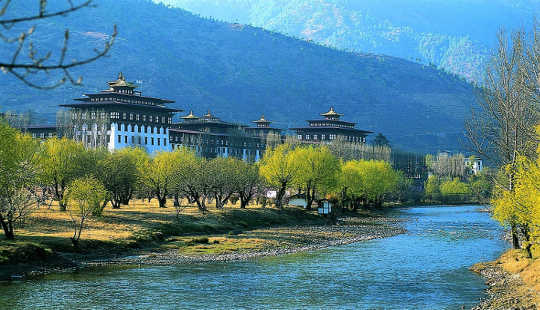
The idea that we can't feed ourselves with sustainable means is scoffed at by many. Without oil, pesticides, and GMOs we will certainly starve we are told by an establishment that sometimes seems without conscience. While Europe operates more on a precautionary mode, the US works more on a "prove I am poisoning you and I will stop" mode. And then some countries don't try at all, which brings to the country of Bhutan.
Some have heard of Bhutan because of it's rejection of modern economics master gauge of success, GDP or gross national product which is crude and full of error. Instead they have led in the use of Gross National Happiness which other countries and some economists are starting to consider.
This Tiny Country Is Going 100 Percent Organic
In 2011, the tiny mountain nation of Bhutan announced a lofty goal: make the country’s agricultural system 100 percent organic by the year 2020. If it succeeded, it would be the first country in the world to achieve the feat.
Get The Latest By Email
Bhutan — nestled in the Himalayas between India and China — only has about 700,000 people living within its borders, and most are farmers. It’s a majority Buddhist kingdom, and its culture reflects several key tenants of that religion — sustainable development, conservation of the environment, preservation of the culture, and good governance.
When we say happiness, it’s not just happiness of humans. It’s happiness of the soil, happiness of the animals, happiness of all sentient beings
In many ways, Bhutan’s size and Buddhist culture makes it the perfect testing ground for transitioning to a completely organic agricultural system. But would such a shift ever be possible for a larger country, like the United States?
“For a country like Bhutan, there are some things that are a lot easier, because they are a smaller country,” Kristine Nichols, chief scientist at the Rodale Institute, a nonprofit that supports research into organic farming, told ThinkProgress. “When you’re looking at a country like the U.S., if we were to go 100 percent organic, more than likely it isn’t going to be an instantaneous process. It’s going to be a transition process.”
Gross National Happiness In Bhutan: The Big Idea From A Tiny State That Could Change The World
by Annie Kelly
Bhutan measures prosperity by gauging its citizens' happiness levels, not the GDP.
A series of hand-painted signs dot the side of the winding mountain road that runs between the airport and the Bhutanese capital, Thimphu. Instead of commands to cut speed or check mirrors, they offer the traveller a series of life-affirming mantras. "Life is a journey! Complete it!" says one, while another urges drivers to, "Let nature be your guide". Another, standing on the edge of a perilous curve, simply says: "Inconvenience regretted."
It's a suitably uplifting welcome to visitors to this remote kingdom, a place of ancient monasteries, fluttering prayer flags and staggering natural beauty. Less than 40 years ago, Bhutan opened its borders for the first time. Since then, it has gained an almost mythical status as a real-life Shangri-La, largely for its determined and methodical pursuit of the most elusive of concepts – national happiness.
Since 1971, the country has rejected GDP as the only way to measure progress. In its place, it has championed a new approach to development, which measures prosperity through formal principles of gross national happiness (GNH) and the spiritual, physical, social and environmental health of its citizens and natural environment.
The Tiny Nation Transforming the Way the World Thinks About Happiness










